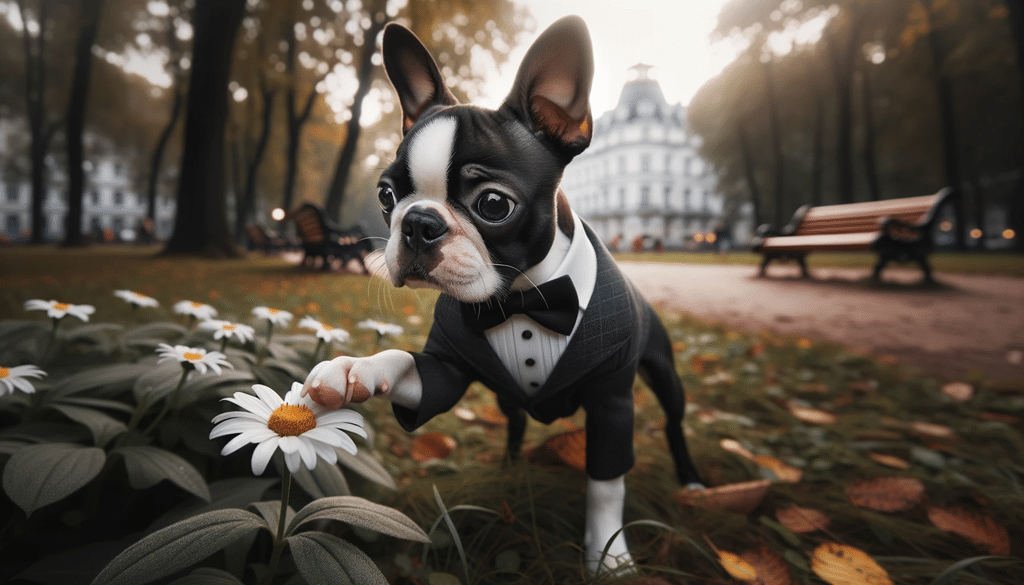You’ve likely seen a French Bulldog or Boston Terrier, but what about a Frenchton? This delightful mix has won many hearts with its compact size and sociable nature. Ideal for apartment living, the Frenchton thrives in quiet, low-energy environments. Whether you’re a family or a solo dweller, this breed’s playful yet chill demeanor could be your perfect match. So, let’s delve into the world of Frenchtons, and see why this breed might be the perfect addition to your life.
Understanding Frenchton’s Breed Characteristics
As a Frenchton owner, you’ll find that these dogs, a mix of Boston Terrier and French Bulldog breeds, have inherited some of the best qualities from both their parent breeds. Frenchtons, also known as Frenchbos, Faux Frenchbos, or Frostons, combine the sociable personality of Boston Terriers with the sturdy build of French Bulldogs. This results in a playful, yet chill canine that’s both fun and easy to be around.
Understanding your Frenchton’s characteristics will help you provide the best possible care for your furry friend. Despite their small size, these dogs are known for their sturdy physique. It’s important to provide them with plenty of physical and mental stimulation, as they’re incredibly intelligent and high-energy. Regular exercise is crucial to prevent them from becoming overweight, which can lead to health issues.
Frenchtons are also highly sociable. They love being around people and other animals, making them excellent family pets. They’re known to be affectionate and protective, always ready to shower their loved ones with attention and care.
When it comes to apartment living, Frenchtons adapt well. They’re generally quiet, and their low-energy nature makes them perfect for confined spaces. However, they still require their daily dose of play and exercise to stay healthy and happy. It’s also key to note that Frenchtons are polite, making them good neighbors in shared spaces.

Frenchton’s Parent Breeds
Diving deeper into the Frenchton’s lineage, you’ll find two distinct parent breeds – the Boston Terrier and the French Bulldog, each adding its unique characteristics to this exquisite mix.
The French Bulldog, also fondly known as Frenchie, is a compact, muscular dog with a smooth coat, snub nose, and strong, sturdy body. They’re renowned for their affectionate nature and adaptability, making them a favorite among city dwellers. Frenchies are equally famous for their bat-like ears and unique expressions.
On the other hand, the Boston Terrier, often referred to as the ‘American Gentleman,’ is known for its friendly and outgoing nature. They have a sleek, muscular body, a distinct black-and-white coat that resembles a tuxedo, and a round head with large, expressive eyes.
When these two breeds are combined, the result is a Frenchton – a dog that inherits the best qualities from both parents. Here’s a snapshot of what you can expect:
- They have the muscular build of a French Bulldog, but with a more pronounced snout, courtesy of the Boston Terrier genes.
- Their coat is mostly short and smooth, requiring minimal grooming.
- Frenchtons are generally healthy dogs, but they can inherit some health issues common to their parent breeds.
- They’re sociable, friendly, and adaptable, making them perfect companions for families, singles, and seniors alike.
In essence, the Frenchton is a charming, sturdy, and sociable dog, thanks to the unique characteristics inherited from its parent breeds. They’re a testament to the saying that sometimes, the whole can indeed be greater than the sum of its parts.
Frenchtons and Apartment Living
Now that we’ve looked at the unique blend of characteristics that Frenchtons inherit from their parent breeds, let’s explore why you’d find them to be the perfect pet for apartment living. As a mix of Boston Terrier and French Bulldog, Frenchtons possess a sturdy and sociable personality. They’re playful, yet relaxed, making them ideal for smaller living spaces like apartments.
Size is not the only factor to consider when choosing an apartment dog, and Frenchtons fall in the medium-small category. They typically weigh between 15 to 25 pounds and stand about 11 to 14 inches tall. However, their compact size doesn’t mean they’re overflowing with energy. On the contrary, these dogs are known for their calm demeanor, which makes them less likely to disturb neighbors with constant activity or noise.
In addition to their size and energy levels, Frenchtons are also renowned for their polite behavior. They’re typically not aggressive or overly protective, which is crucial in shared spaces where they might encounter strangers regularly. This makes them a good fit if you’re living in a building with many residents or if you have frequent visitors.
Another notable trait of Frenchtons that makes them suitable for apartment living is their adaptability. These dogs can quickly adjust to new environments and routines, making the transition to apartment living smooth and stress-free for both the dog and the owner.
Ideal Living Conditions for Frenchtons
In your journey to understand Frenchtons better, it’s essential to know what living conditions suit them best. These dogs, a mix of French Bulldog and Boston Terrier, thrive in environments where they feel loved, secure, and stimulated.
Frenchtons, with their medium size and substantial energy levels, are adaptable to both apartment and house living. However, they do have specific needs to keep them happy and healthy. Here are some ideal conditions for your Frenchton:
- Enough Space: Though they’re small, they enjoy exploring and need room to play. Make sure your living area has enough space for them to move around comfortably.
- Exercise: Frenchtons are active dogs. They don’t require extensive exercise, but daily walks and playtime are essential.
- Temperature Control: Frenchtons may struggle in extreme temperatures. Keep your home reasonably cool in summer and adequately warm in winter.
- Love and Attention: These dogs are affectionate and social. They crave attention and companionship, so ensure you spend quality time with them daily.
While these conditions are ideal, remember that every Frenchton is unique, and their needs may vary. Some may be more active and require more space and exercise than others. Others may be more sensitive to temperature changes. Be attentive to your Frenchton’s individual needs and adjust their environment accordingly.
Examining Frenchton’s Friendliness
Continuing your exploration into the nature of Frenchtons, let’s delve into their friendly and sociable temperament. These dogs are a delightful crossbreed between the Boston Terrier and the French Bulldog, inheriting the best qualities from both parent breeds. Frenchtons are renowned for their sturdy, sociable personality, making them an excellent companion for individuals and families alike.
Their playful and chill nature contributes significantly to their appeal. These dogs love to engage in fun activities, but they’re also perfectly content to lounge around with their human companions. Their adaptability to various situations is part of their charm and one of the reasons why they’re such a beloved breed.
Frenchtons are especially known for their friendly demeanor towards other pets and children. They’re also called Frenchbo, Faux Frenchbo, and Froston, names that reflect the affection people have for them. Despite their small size, Frenchtons can fill your home with laughter and joy, their warm hearts and wagging tails a constant source of happiness.
However, it’s crucial to remember that every dog, including Frenchtons, requires proper socialization from a young age. This process helps them develop into well-rounded, friendly dogs that can interact positively with people and other animals. With the right training and care, Frenchtons can indeed be the epitome of friendliness, their love and loyalty enriching the lives of their owners.
The Joy of Owning a Frenchton
Despite the responsibilities that come with it, owning a Frenchton can fill your life with an immeasurable amount of joy and laughter. These dogs, a mix of Boston Terrier and French Bulldog breeds, are known for their playful and sociable nature, which makes them a fantastic addition to any home. They bring a unique zest and playfulness that can lift your spirits even on the most stressful days.
Here are some of the joys you can experience while owning a Frenchton:
- A Constant Companion: Frenchtons are inherently social creatures. They’ll follow you from room to room, and their company can make you feel loved and appreciated.
- A Source of Laughter: Their playful antics and expressive faces will invariably bring a smile to your face. It’s hard not to laugh at their silly games and mischievous behavior.
- A Fitness Partner: Frenchtons love to play and go for walks. They can motivate you to stay active and maintain a healthy lifestyle.
- An Emotional Support: Dogs are known for their therapeutic effects. A Frenchton’s affectionate nature can help reduce feelings of anxiety and loneliness.

Frequently Asked Questions
What Are the Common Health Issues of a Frenchton?
You’re curious about common health issues of a dog breed, but not just any breed, the Frenchton. This adorable pup, a mix of French Bulldog and Boston Terrier, can be prone to certain issues. Brachycephalic syndrome, hip dysplasia, and various eye conditions might afflict your furry friend. Remember, regular vet check-ups and a healthy lifestyle can mitigate these risks. It’s crucial to understand these concerns, ensuring your Frenchton leads a comfortable, happy life.
What Is the Average Lifespan of a Frenchton Dog?
You’re curious about the average lifespan of a Frenchton dog. They typically live between 10 to 14 years. Like all breeds, their lifespan is influenced by several factors, including diet, exercise, and overall health. Regular vet check-ups and a balanced lifestyle can contribute to a longer, healthier life. Bear in mind, individual health issues may vary and while this is the average, some Frenchtons may live longer with good care.
How Often Should a Frenchton Be Groomed?
You should groom your Frenchton regularly, ideally once a week. Their short coat doesn’t shed much, but regular brushing keeps it healthy and shiny. Bathing should be done only when necessary, to avoid drying out their skin. Don’t forget to clean their ears and teeth regularly, and trim their nails monthly. Regular grooming not only keeps your Frenchton looking good, but also allows you to monitor their health closely.
What Specific Dietary Needs Do Frenchtons Have as Opposed to Other Breeds?
When considering the dietary needs of a Frenchton, you’ll find they aren’t drastically different from other breeds. They require balanced nutrition with proteins, carbohydrates, fats, vitamins, and minerals. However, Frenchtons are prone to obesity, so portion control is key. Also, some Frenchtons may have allergies, requiring a special diet. It’s always best to consult your vet for a personalized diet plan.
Are Frenchtons Good With Children and Other Pets?
Yes, Frenchtons are generally good with children and other pets. They’re known for their sociable and friendly nature, making them great family pets. However, it’s always important to supervise interactions between dogs and small children. Similarly, introducing them properly to other pets ensures a peaceful cohabitation. Remember, each dog has its own personality, so it’s essential to be patient and provide appropriate training for the best possible relationships.
Conclusion
In essence, the Frenchton’s charm lies not only in its adorable appearance, but also in its amicable nature. This little bundle of joy is tailor-made for apartment living and its affectionate personality makes it a perfect match for families and individuals alike. So, if you’re seeking a companion that offers both fun and tranquility, the Frenchton might just be your ideal furry friend. It’s about time you welcomed this delightful canine into your heart and home.


